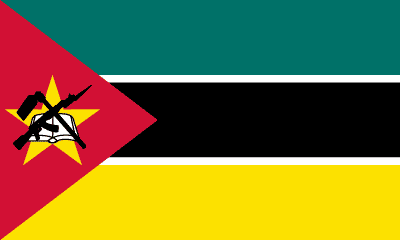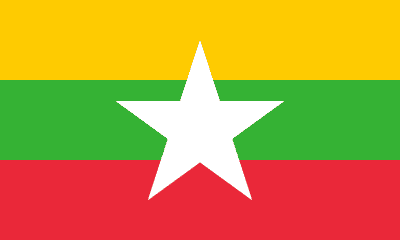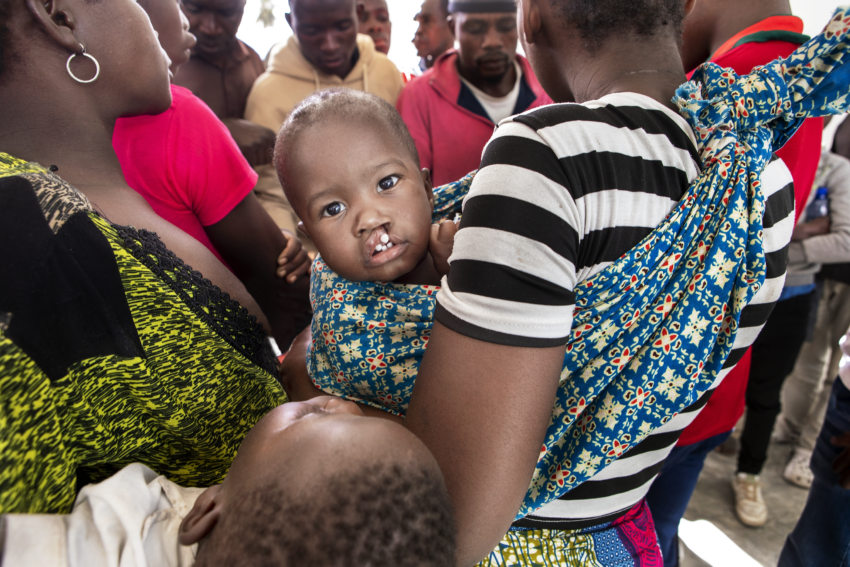
Operation Smile Mozambique has conducted three surgical programs, delivering high-quality surgeries for around 230 patients living with cleft conditions.
THE NEED
14,000 children. In Mozambique, it is estimated that nearly 14,000 children aged 14 and under live with untreated cleft conditions.
Strained health system. The Mozambican civil war that took place in 1977-1992 and the insurgency in the northeastern province of Cabo Delgado that started in 2017 have had lasting effects on the country’s healthcare system. Almost one million people are currently displaced since extreme violence erupted in Cabo Delgado. Many displaced individuals lack access to adequate health services.
Barriers to care. The country’s severe shortage of health facilities means patients must routinely travel long distances to reach healthcare facilities. 66% of the population is at risk of impoverishing expenditure for surgical care, while 23% faces catastrophic expenditure in case of surgical care.
Shortage of hospital staff. Mozambique suffers from a significant shortfall of medical professionals. The country has just one specialist surgical worker per 100,000 population, falling short of the minimum target of 20 providers set by the Lancet Commission on Global Surgery. The lack of providers contributes to an insufficient number of surgical procedures. The Lancet Commission proposed that countries should perform 5,000 surgical procedures per 100,000 population. In stark contrast, Mozambique achieves just 367 procedures per 100,000 people, leaving behind many people born with cleft lip and cleft palate.
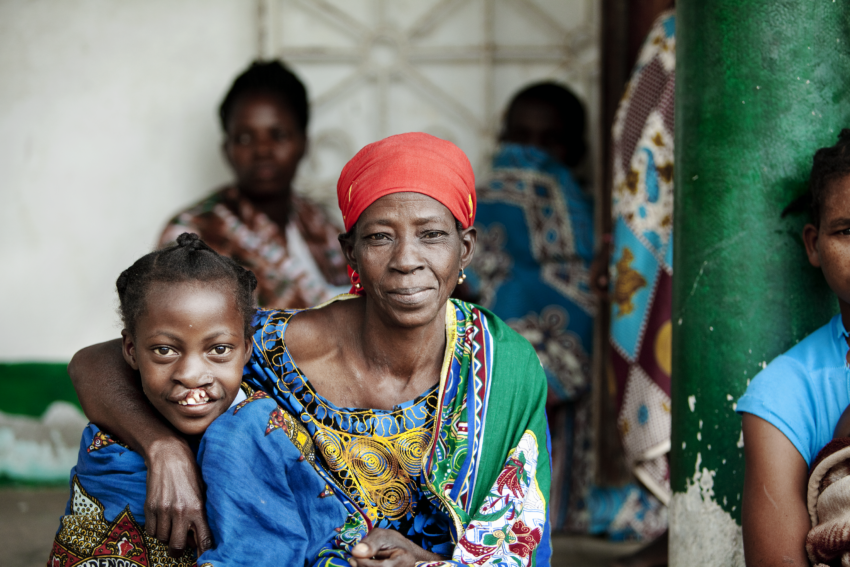
OUR FORMULA FOR TRANSFORMATION
Operation Smile’s formula for transformational impact combines care delivery & capacity-building.
Education programs are at the center of Operation Smile’s strategy to increase access to surgery closer to the patient’s home.
Each surgical program brings together providers from all over the world for a unique opportunity to share knowledge and innovate. This type of bi-directional learning is essential to redistributing knowledge between providers and building capacity in the areas of greatest need.
Our work in health infrastructure & equipment addresses structural barriers to care and helps build robust health systems. Operation Smile’s research & innovation efforts inform all aspects of our decision-making and allow us to have a comprehensive understanding of the impact our programs have on patients.
HUB & SPOKES
To ensure that every child has access to care close to home, we equip the providers within our patients’ communities with skills and resources to deliver high quality care. We build the needed capacity by harnessing the talent and resources that exist within the country, usually in the bigger cities, the hubs, to train providers in under-resourced areas, the spokes, where most patients lack access to care.
In Mozambique, our hubs based at the Nampula Central Hospital in Nampula and at the Maputo Central Hospital in Maputo provide year-round care for our patients.
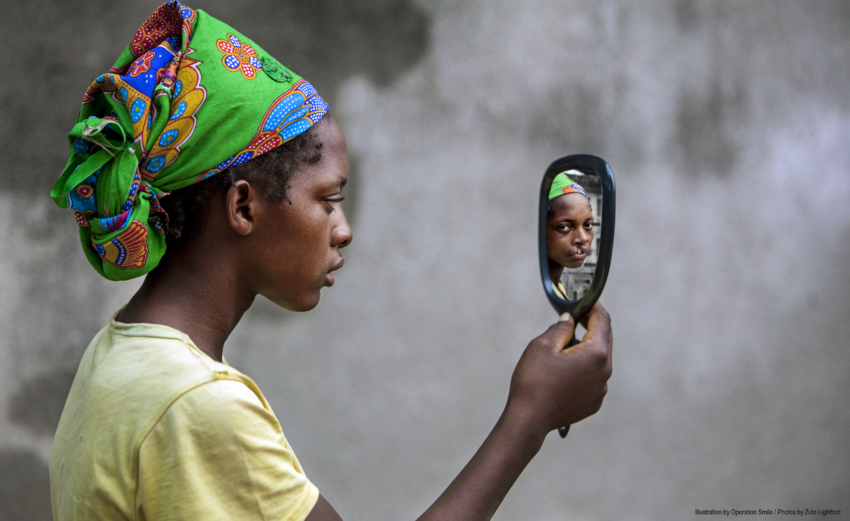
Madalena, 21 years old, gazes at her reflection in the mirror as she awaits her cleft lip surgery.
During Fiscal Year July 2024-June 2025, Operation Smile Canada has committed to invest $293,088 CAD accounting for 41% of Mozambique’s total projected budget for the fiscal year, which will directly contribute to providing high-quality surgery and care for 170 patients and train over 80 health workers.
In the next three years, we will perform surgeries for over 870 patients and provide around 1,100 patients with comprehensive cleft care consultations.
Cleft Care Programs
Operation Smile will provide surgical care to around 170 patients, speech therapy consultations to two patients, psychosocial care to around 140 patients and nutrition services to 40 patients. We project to recruit 320 new patients in need of cleft care.
Education Programs
Operation Smile will deliver specialized training to over 80 health workers. We will provide volunteers with American Heart Association training and offer training to plastic surgeons, anesthesiologists, cleft surgeons, biomedical technicians, psychosocial experts and speech therapists.

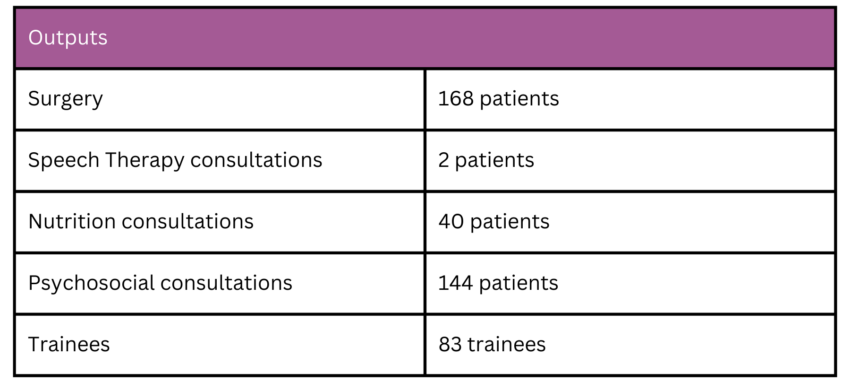
THREE-YEAR VISION
Working alongside Mozambican medical professionals, Operation Smile projects to deliver surgical care to 870 patients in the next three years. Additionally, we will provide over 1,100 patients with comprehensive care.
Operation Smile will increase access to health care by providing high-quality education and training for approximately 260 health workers in Mozambique. Training providers will allow us to launch hospital-based partnership programs across the country and expand the reach of our programs.

